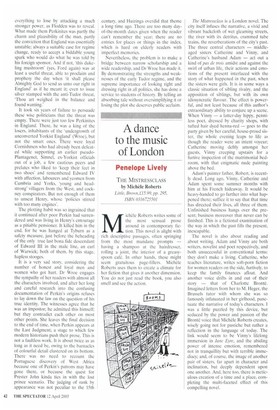A dance to the music of London
Penelope Lively
THE MISTRESSCLASS by Michele Roberts Little, Brown, £15.99, pp. 295, ISBN 0316725501 Michele Roberts writes some of the most sensual prose around in contemporary fiction. This novel is alight with rich descriptive passages, often springing from the most mundane prompts — having a shampoo at the hairdresser, rolling a joint, the interior of a greasyspoon café. In other hands, these might seem gratuitous page-fillers. Michele Roberts uses them to create a climate for her fiction that gives it another dimension. You do not just read the book, you also smell and see the action.
The Mistressclass is a London novel. The city itself infuses the narrative, a vivid and vibrant backcloth of wet gleaming streets, the river with its detritus, crammed tube trains, the reverberations of the city's past. The three central characters — middleaged sisters Catherine and Vinny, and Catherine's husband Adam — act out a kind of pas de trois amidst and against the swirl of urban life, their actions and emotions of the present interlaced with the story of what happened in the past, when the sisters were girls. It is in some ways a classic situation of sibling rivalry, and the apposition of siblings, but with its own idiosyncratic flavour. The effect is powerful, and not least because of this author's extraordinary ability to conjure up a scene.
When Vinny a latter-day hippy, penniless poet, dressed by charity shops, with tufted hair dyed henna-red — goes to the party given by her careful, house-proud sister, the whole evening leaps to life as though the reader were an intent voyeur; Catherine moving deftly amongst her guests, Vinny creeping upstairs for a furtive inspection of the matrimonial bedroom, with that enigmatic nude painting above the bed.
Adam's painter father, Robert, is recently dead. Long ago, Vinny, Catherine and Adam spent some summer months with him at his French hideaway. It would be heavy-handed to go further into what happened there; suffice it to say that that time has directed their lives, all three of them. Unfinished business hangs over the present; business moreover that never can be finished. This is a fictional examination of the way in which the past fills the present, inescapable.
The novel is also about reading and about writing. Adam and Vinny are both writers, novelist and poet respectively, and both unsuccessful in conventional terms: they don't make a living. Catherine, who teaches literature, writes soft-porn fiction for women readers on the side, furtively, to keep the family finances afloat. And another voice drifts in and out of their story — that of Charlotte Bmnte. Imagined letters from her to M. Heger, the Brussels tutor with whom she was so famously infatuated in her girlhood, punctuate the narrative of today's characters. I was a little puzzled by this device, but seduced by the power and passion of the Brontë voice that Michele Roberts creates, wisely going not for pastiche but rather a reflection in the language of today. The link would seem to be Vinny's lifelong immersion in Jane Eyre, and the abiding power of intense emotion, remembered not in tranquillity but with terrible immediacy; and, of course, the image of another pair of sisters, far apart in character and inclination, but deeply dependent upon one another. And, here too, there is meticulous creation of a time and a place, completing the multi-faceted effect of this compelling novel,


































































 Previous page
Previous page